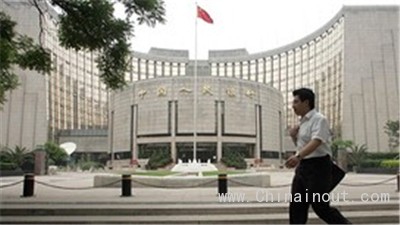中国已采取措施刺激不断放缓的经济,央行大幅下调商业银行存款准备金率,这个强大的信号表明政府有意提振疲弱的增长。
中国央行下调金融机构存款准备金率1个百分点,让商业银行有更多资金向企业放贷。几天前发布的数据显示,中国经济在今年第一季度以6年来最慢的速度扩张。
中国央行以往只有一次以同样大的幅度下调存准率,那是在2008年11月,即金融危机最严重时期。
“这个信号清楚地表明,中国已进入一个激进的货币宽松周期,以对抗经济放缓和不断上升的通缩风险。”澳新银行(ANZ)的经济学家们表示,“这个出人意料之举似乎表明,当局对中国企业面对的实际利率居高不下问题感到沮丧。”
存款准备金率(简称RRR)规定了商业银行吸纳的存款中,有多大一部分必须存在中国央行,这些资金不能用于放贷和进行其他投资。
此前,中国自去年11月以来已两次下调基准利率,一次下调存准率。最近这次下调使存准率降至18.5%,力度超出分析师之前预期的本月某个时刻降准50个基点。几天前发布的数据显示,受建筑业和制造业放缓的拖累,今年首季度中国经济同比增速放缓至7%。
这是自2009年初以来最疲弱的季度扩张。中国政府此前宣布,2015年增长目标为“7%左右”。
中国近年来的迅猛增长迫使央行保持较高的存准率,以帮助控制资本流入。但现在,增长放缓已减少了境外资金流入,而中国各银行的净外汇购买量在去年12月和今年1月录得史上最大幅度的下降。
“随着资本流入直线下滑,央行仅仅是为了保持货币政策中性,就需要以相当大的幅度下调存款准备金率,”龙洲经讯(Gavekal Dragonomics)的白安儒(Andrew Batson)表示。这家研究公司预测,中国今年将下调存款准备金率200个基点或更多。
下调存准率的消息在周日出炉的前一天,官方数据显示,3月份新房均价连续第七个月出现同比下降。
然而,在多个城市出台鼓励购房的措施后,房价降幅与2月份相比有所收窄。上海的房价持平,而北京和深圳的房价有所上涨。
房价下降的放缓似乎表明,过去一年出台的放松措施正开始产生效果。
在中国国家统计局追踪的全国70个大中城市中,有50个城市的新建商品住宅价格在3月份环比下降,而前一个月的这个数字为66个。根据英国《金融时报》对中国官方数据的分析,3月份平均房价同比下降6.1%,但环比降幅只有0.2%。2月份的房价环比降幅为0.4%。
从水泥、建筑到家具和其他消费品,房地产支撑着大约40个行业。它大约占到中国经济活动的15%。
春季购房量的正常上扬起到了一定作用,但房产中介也报告称,他们比平常更忙了。
“过去一个月的销售速度高于过去两三年。一些在市场上放了一年多的公寓突然就卖掉了,”北京房产中介万洁(音)表示。
上月下旬,当局降低了购买第二套住房的首付款要求,并将营业税的免征门槛从五年缩短至两年。这些举措出台之际,中国政府越来越担忧整体经济放缓的速度。
这些放松举措逆转了前总理温家宝出台的限制政策,后者意在抑制银行放贷和购房行为,以遏止在政治上失分的高端房价上涨。
China has acted to stimulate its slowing economy, cutting sharply the level of cash commercial banks must park with the central bank in a strong signal of intent to boost flagging growth.
The People’s Bank of China moved to free up cash to lend to business by cutting its so-called the reserve requirement ratio by 1 percentage point just days after data revealed the country’s economy expanded its slowest pace for six years in the first quarter.

The PBoC has only once before reduced the reserve requirement ratio by as much and that was during the depths of the financial crisis in November 2008.
“This clearly signals that China has entered into an aggressive monetary easing cycle, to counter the economic slowdown and the rising deflation risk,” said economists at bank ANZ. “This surprising move suggests the authorities are frustrated by the stubbornly high real interest rates facing the Chinese enterprises.”
The required reserve ratio, known as the RRR, specifies the portion of a commercial bank’s deposits that must be held on reserve at China’s central bank, wher it is unavailable for loans and other investments.
China has already cut benchmark interest rates twice and lowered the RRR once since November. The size of the latest reduction to 18.5 per cent exceeds analyst expectations for a 50 basis point cut sometime this month, after first-quarter growth slipped to 7 per cent, held back by a slowdown in construction and manufacturing.
That was the weakest quarterly expansion since early 2009. The Chinese government had previously announced a growth target of “around 7 per cent” for 2015.
China’s booming growth in recent years forced the PBOC to keep bank reserves high to help manage capital inflows. But now, slower growth has reduced the amount of foreign money flowing in while Chinese banks’ net foreign exchange purchases recorded their largest-ever decline in December and January.
“With the fall-off in capital inflows the central bank needs to cut reserve requirements fairly substantially just to keep monetary policy neutral,” said Andrew Batson of Gavekal Dragonomics, which forecasts that China will cut RRR by 200 basis points or more this year.
The move to lower the RRR on Sunday came a day after official data showed average new home prices fell year on year for a seventh consecutive month in March.
However, the dro narrowed from February after a number of cities introduced measures to encourage purchases. In Shanghai, home prices were flat, while prices in Beijing and Shenzhen rose.
The slower pace of decline in property prices suggests loosening measures adopted over the past year are starting to feed through.
New home prices fell in 49 of the 70 cities tracked by the statistics bureau, compared with 66 cities last month. Average prices fell by 6.1 per cent in March compared with a year ago, according to an FT analysis of official figures, but only by 0.2 per cent compared with a month earlier. In February, prices dropped 0.4 per cent from the month before.
Real estate supports about 40 industries, from cement and construction to furniture and other consumer goods. It accounts for about 15 per cent of Chinese economic activity.
A normal uptick in home buying during the spring played a role, but property agents also reported they were busier than usual.
“The rate of sales has been higher in the past month than it has for the past two or three years. Some apartments that have been on the market for over a year have suddenly sold,” said Wan Jie, a real estate agent in Beijing.
Late last month, authorities reduced minimum down payments for buyers of second homes and also cut to two years the length of time a seller had to have owned the home in order to avoid paying a business tax. The moves come as Chinese authorities become increasingly concerned at the rate at which the country’s broader economic growth is slowing.
The relaxing of restrictions winds back constraints put in place by former premier Wen Jiabao, whose curbs on bank lending and property purchases were designed to stop a politically unpopular rise in high-end housing prices.
Those policies helped feed the growth of China’s shadow banking sector, as desperate property developers turned to unregulated high-interest loans, and marked the incursion of state-owned developers into a sector that had previously been dominated by private entrepreneurs.











